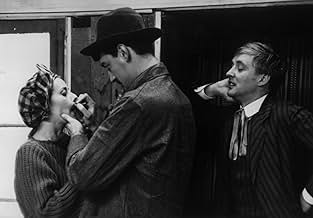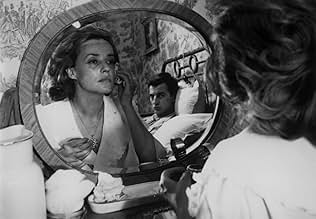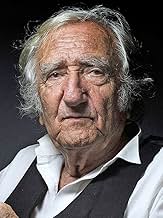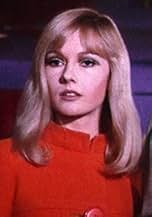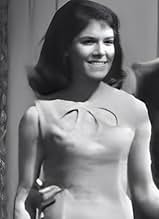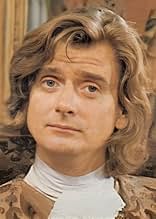CALIFICACIÓN DE IMDb
7.7/10
46 k
TU CALIFICACIÓN
Décadas de un triángulo amoroso entre dos amigos y una impulsiva mujer.Décadas de un triángulo amoroso entre dos amigos y una impulsiva mujer.Décadas de un triángulo amoroso entre dos amigos y una impulsiva mujer.
- Dirección
- Guionistas
- Elenco
- Nominada a2premios BAFTA
- 3 premios ganados y 4 nominaciones en total
Oskar Werner
- Jules
- (as Oscar Werner)
Serge Rezvani
- Albert
- (as Bassiak)
Michel Subor
- Récitant
- (voz)
- …
Danielle Bassiak
- Compagnon d'Albert
- (sin créditos)
Elen Bober
- Mathilde
- (sin créditos)
Pierre Fabre
- Ivrogne in Cafe'
- (sin créditos)
Dominique Lacarrière
- Une des femmes
- (sin créditos)
Bernard Largemains
- Merlin
- (sin créditos)
Kate Noelle
- Birgitta
- (sin créditos)
Jean-Louis Richard
- Cliente au Cafe'
- (sin créditos)
Michel Varesano
- Cliente au Cafe'
- (sin créditos)
Christiane Wagner
- Helga
- (sin créditos)
- Dirección
- Guionistas
- Todo el elenco y el equipo
- Producción, taquilla y más en IMDbPro
Opiniones destacadas
This is the first movie by Truffault I've ever seen, and I have to say I'm now very intrigued in his other work...
"Jules et Jim" is the story of two friends who meet a very beautiful and strange woman who turns up to be a bit unstable...
It starts with how they all meet each other and end up together... I thought the beginning was pretty fast as many things happened and you just wonder if the whole movie will be like that. Also I thought I didn't care much for any character, but of course it was too quick to judge. There is also a narrator (throughout the movie) and at first you ask yourself if its really necessary...
Still, when I decided to go grab a snack, I realized I was so hooked by the story that I couldn't. The characters behaved like no other I've seen and you find yourself wanting two different things: for it to end and for it never to end.
The movie has it's many twists for those who like, even a laugh here and there, but if you see it as a whole is a very deep description of the relationship between the three main characters.
The end is somehow beautiful, maybe because is "fair", maybe because is "real", maybe because is "surreal", you'll just have to watch and find out...
Is one of those movies when after watching it you understand both sides: those who say it's overrated and those who claim it's a masterpiece... to me it was a one in a lifetime film experience
"Jules et Jim" is the story of two friends who meet a very beautiful and strange woman who turns up to be a bit unstable...
It starts with how they all meet each other and end up together... I thought the beginning was pretty fast as many things happened and you just wonder if the whole movie will be like that. Also I thought I didn't care much for any character, but of course it was too quick to judge. There is also a narrator (throughout the movie) and at first you ask yourself if its really necessary...
Still, when I decided to go grab a snack, I realized I was so hooked by the story that I couldn't. The characters behaved like no other I've seen and you find yourself wanting two different things: for it to end and for it never to end.
The movie has it's many twists for those who like, even a laugh here and there, but if you see it as a whole is a very deep description of the relationship between the three main characters.
The end is somehow beautiful, maybe because is "fair", maybe because is "real", maybe because is "surreal", you'll just have to watch and find out...
Is one of those movies when after watching it you understand both sides: those who say it's overrated and those who claim it's a masterpiece... to me it was a one in a lifetime film experience
Two lads from different backgrounds form a bond, a French boy with dark hair, an Austrian blond, quite Bohemian in their ways, taking pleasure all their days, and then Catherine makes it three, and waves her wand. Jim is smitten with this beauty and he falls, but then war breaks out, and homeland duty calls, so they marry, relocate, intense fighting means a break, she has a child, world reconciles, and bonds remake. Jules travels to the home of his two friends, where the triangle rotates, gyrates and bends, now he's coupled with Catherine, but Jim feels no chagrin, though it's clear this isn't where the story ends.
Jeanne Moreau is always outstanding!
Jeanne Moreau is always outstanding!
Although "Jules and Jim" was made over 40 years ago and takes place 40 to 50 years before that, the amazing thing is that it barely seems to have dated. Because it focuses on the universal human relationships between its characters, rather than the specific time in which they live, it's the rare film set in the past that doesn't feel like a "period film." And, especially in the first half of the movie, Truffaut's New Wave techniques lend a remarkable energy and freshness.
The movie explores friendship and love among three semi-bohemian types: Parisian Jim (Henri Serre), Austrian Jules (Oskar Werner), and Catherine (Jeanne Moreau), the beautiful, free-spirited woman whom they both love. She's the most vibrant character in the movie, and impossible to pin down. It's never clear who she lovesshe contradicts herself repeatedly, and perhaps loves no one but herselfor whether she's diabolical or simply misunderstood. Moreau nearly steals the movie, if not for the fact that the title reminds us to focus on the relationship between the two men, and that Serre and Werner give good performances too. Even if Jim and Jules aren't as mysterious as Catherine, they're complex and interesting characters in their own right.
The story plays out rather episodically, which means "Jules and Jim" is full of wonderful little moments, often involving the crazy things Catherine does. Some of my favorites include her dressing up as a man and racing Jules and Jim across a bridge; her jumping into the Seine in frustration; and her singing the movie's charming theme song, "The Whirlpool of Life." The episodes are linked together by surprisingly unobtrusive off-screen narration, which keeps the film moving along rather than slowing it down.
"Jules and Jim" does get a little tiresome toward the end, with Catherine continually vacillating between the men in her life, Jim vacillating between Catherine and his old girlfriend Gilberte, and Jules remaining loyally devoted to Catherine despite how foolish this may seem. However, the movie is redeemed by its tragic final scenes, which poignantly contrast with the carefree gaiety of the beginning. Jules, Jim, and Catherine are caught in a destructive spiral, tossed and defeated by the whirlpool of life. Still, the tone of the movie is gentle and human, not pessimistic. Truffaut considered "Jules and Jim" a "hymn to life," and it is most memorable as a vivid celebration of friendship and youthful possibility, even as it acknowledges how those things can sour.
The movie explores friendship and love among three semi-bohemian types: Parisian Jim (Henri Serre), Austrian Jules (Oskar Werner), and Catherine (Jeanne Moreau), the beautiful, free-spirited woman whom they both love. She's the most vibrant character in the movie, and impossible to pin down. It's never clear who she lovesshe contradicts herself repeatedly, and perhaps loves no one but herselfor whether she's diabolical or simply misunderstood. Moreau nearly steals the movie, if not for the fact that the title reminds us to focus on the relationship between the two men, and that Serre and Werner give good performances too. Even if Jim and Jules aren't as mysterious as Catherine, they're complex and interesting characters in their own right.
The story plays out rather episodically, which means "Jules and Jim" is full of wonderful little moments, often involving the crazy things Catherine does. Some of my favorites include her dressing up as a man and racing Jules and Jim across a bridge; her jumping into the Seine in frustration; and her singing the movie's charming theme song, "The Whirlpool of Life." The episodes are linked together by surprisingly unobtrusive off-screen narration, which keeps the film moving along rather than slowing it down.
"Jules and Jim" does get a little tiresome toward the end, with Catherine continually vacillating between the men in her life, Jim vacillating between Catherine and his old girlfriend Gilberte, and Jules remaining loyally devoted to Catherine despite how foolish this may seem. However, the movie is redeemed by its tragic final scenes, which poignantly contrast with the carefree gaiety of the beginning. Jules, Jim, and Catherine are caught in a destructive spiral, tossed and defeated by the whirlpool of life. Still, the tone of the movie is gentle and human, not pessimistic. Truffaut considered "Jules and Jim" a "hymn to life," and it is most memorable as a vivid celebration of friendship and youthful possibility, even as it acknowledges how those things can sour.
Time and revisionist critics have tried to tarnish the gleam of Truffaut's final masterpiece - citing its apparent misogyny and apoliticism; but for some of us, 'Jules et Jim' is the unforgettable film that opened the gates to both European film, and the great masters of American cinema like Hitchcock, Hawks and Ray.
'Jules et Jim' is, along with 'Citizen Kane', THE vindication of the pleasures of cinematic form: the first half especially, in its rush of narrative registers and technical exuberance, is unparalleled in modern film. This isn't mere trickery - the use of paintings, books, plays, dreams, conversations, documentary footage, etc., as well as the different ways of telling a story through film, all point to the movie's theme - how do you represent people and the world in art without destroying them? Or is art the only to save people and life from extinction?
The foregrounding of theatricality, acting, disguises, pseudonyms, games, works-within-the-work, all point to the high modernism in which the film is set, when the old certainties about identity and place were being destroyed by the Great War. In fact the film could be considered Cubist in the way it uses film form to splice up and rearrange images, space, characters, viewpoints.
Truffaut's film is a beautiful elegy about time: the historical time heading towards destruction in the shape of the Nazis, and the circular time of love, obsession and art. These times struggle in the film's structure, history zipping past years in the framing, Parisian sections, and days stretching out interminably in the central rural rondelay.
Far from being misogynistic, the film places Catherine's speech about 'grains of sand' at its philosophical heart. AND she's played by Jeanne Moreau, the most honest and human of all great actresses.
'Jules et Jim' is, along with 'Citizen Kane', THE vindication of the pleasures of cinematic form: the first half especially, in its rush of narrative registers and technical exuberance, is unparalleled in modern film. This isn't mere trickery - the use of paintings, books, plays, dreams, conversations, documentary footage, etc., as well as the different ways of telling a story through film, all point to the movie's theme - how do you represent people and the world in art without destroying them? Or is art the only to save people and life from extinction?
The foregrounding of theatricality, acting, disguises, pseudonyms, games, works-within-the-work, all point to the high modernism in which the film is set, when the old certainties about identity and place were being destroyed by the Great War. In fact the film could be considered Cubist in the way it uses film form to splice up and rearrange images, space, characters, viewpoints.
Truffaut's film is a beautiful elegy about time: the historical time heading towards destruction in the shape of the Nazis, and the circular time of love, obsession and art. These times struggle in the film's structure, history zipping past years in the framing, Parisian sections, and days stretching out interminably in the central rural rondelay.
Far from being misogynistic, the film places Catherine's speech about 'grains of sand' at its philosophical heart. AND she's played by Jeanne Moreau, the most honest and human of all great actresses.
Whenever a commentator declares outright that a film is a complete waste of time and that nobody, BUT NOBODY, should ever watch it, I tend to peg that commentator as an opinionated ass. So I would never say that about a well-respected film like "Jules and Jim." But quite honestly, I can't warm up to it. I've watched it on more than one occasion over the years, and it never fails to put me to sleep at both ends of my anatomy. I've just viewed a DVD edition in which a film scholar clearly explains his views on the fascination of "Jules and Jim." But I still couldn't see why the relationship of these three tedious characters, discussed and analyzed in all its very tedious minutiae by those same characters and an off-screen narrator (also tedious), should interest me. It's certainly beloved by academic types (maybe for those very same characteristics?), and film critics eat it up like it has gravy on it. Like another commentator, I'm a bit puzzled by all the comments about its lyrical, lighthearted and idyllic qualities. I'm left with the impression of a rather dry, academic dissertation on the complexities of male-female relationships ca. 1961 (the 1910 setting seems to me immaterial to the script).
I can't help feeling that I'm missing something, and I'm not averse to French films, but they're usually older, pre-new-wave films, for example "Forbidden Games," "French Can-Can," or Pagnol's "Fanny" trilogy. I take it that the sentimentality of such films is one of the things new wave directors reacted against. If so, I can't jump on their bandwagon, try as I might. I've enjoyed some of Truffaut's work, but not this, I'm afraid.
To those who love and appreciate "Jules and Jim" -- have pleasure of it. I envy you for that, and maybe I'll try it again in a few years.
I can't help feeling that I'm missing something, and I'm not averse to French films, but they're usually older, pre-new-wave films, for example "Forbidden Games," "French Can-Can," or Pagnol's "Fanny" trilogy. I take it that the sentimentality of such films is one of the things new wave directors reacted against. If so, I can't jump on their bandwagon, try as I might. I've enjoyed some of Truffaut's work, but not this, I'm afraid.
To those who love and appreciate "Jules and Jim" -- have pleasure of it. I envy you for that, and maybe I'll try it again in a few years.
¿Sabías que…?
- TriviaHenri-Pierre Roché's original novel was based on his own experiences as a young man. The original Catherine was still alive when the film was released and even attended the premiere incognito.
- ErroresWhen Catherine lights the letters on fire, they are at first away from her dress, but in the next shot they are burning on top of her dress.
- Versiones alternativasThe Criterion Region 1 disc and the Tartan Region 2 DVD have a scene in which the film is reversed left/right. When Jules, Jim, and Albert are sitting on the grass sharing stories about the war, the order of the three characters repeatedly changes between shots. This does not occur in other DVD releases of this film, including the Fox/Lorber Region 1 release.
- ConexionesEdited into Laggiù qualcuno mi ama (2023)
Selecciones populares
Inicia sesión para calificar y agrega a la lista de videos para obtener recomendaciones personalizadas
- How long is Jules and Jim?Con tecnología de Alexa
Detalles
- Fecha de lanzamiento
- País de origen
- Idiomas
- También se conoce como
- Jules and Jim
- Locaciones de filmación
- Productoras
- Ver más créditos de la compañía en IMDbPro
Taquilla
- Total en EE. UU. y Canadá
- USD 509
- Fin de semana de estreno en EE. UU. y Canadá
- USD 11,206
- 25 abr 1999
- Total a nivel mundial
- USD 496,383
- Tiempo de ejecución1 hora 45 minutos
- Color
- Mezcla de sonido
- Relación de aspecto
- 2.35 : 1
Contribuir a esta página
Sugiere una edición o agrega el contenido que falta

Principales brechas de datos
By what name was Jules y Jim (1962) officially released in India in English?
Responda
![Ver Bande-annonce [OV]](https://m.media-amazon.com/images/M/MV5BMWM5OGI0MjUtZDRhMC00ZGQ1LTk0NWEtMWMzZDFhMjA1OTk1XkEyXkFqcGdeQXRodW1ibmFpbC1pbml0aWFsaXplcg@@._V1_QL75_UX500_CR0)
